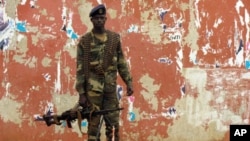International human rights group Amnesty International said Tuesday that the military in Guinea-Bissau is increasingly restricting the rights of protestors, media, and some politicians after last week’s coup.
“Since the coup, there has been a kind of witch hunt of politicians, including ministers,” said Amnesty’s Guinea-Bissau expert, Marise Castro. “As far as we know, most of them seem to be in hiding, but we are concerned about a couple of them whose whereabouts we don’t know.”
Last week the military in Guinea-Bissau took over the government, less than a month before the country was scheduled to choose a new president. The scheduled runoff presidential vote would have pitted former President Kumba Yala against frontrunner former Prime Minister Carlos Gomes Junior. Coup leaders have detained Gomes along with interim President Raimundo Pereira since April 12.
“The conditions of their detention are quite bad,” said Castro. “People who know where they are, I mean the cells and the barracks, have told us that they are infested with mosquitos, there is no sanitation, there is no water.”
According to Amnesty, peaceful demonstrations were also violently repressed recently when soldiers beat protestors with guns. Private news stations were also shut down, though Castro said the military then asked the broadcasters to resume, albeit under broad censorship.
The African Union Tuesday suspended Guinea-Bissau’s membership, saying coup leaders are violating the constitution. In his statement, AU Commission Chairman Jean Ping urged Guinea-Bissau politicians to avoid involvement in what he called “window dressing for the takeover.”
Ping also said the coup leaders are trying to arbitrarily halt an ongoing election process. The runoff election was to replace the late president, Malam Bacai Sanha, who died in January after a long illness.
On Monday, U.N. Secretary-General Ban Ki-moon expressed "grave concern" over the crisis in Guinea-Bissau.
The country has endured decades of instability marked by numerous coups and coup attempts and the assassination of President Joao Bernardo Vieria in 2009 by renegade soldiers. Guinea-Bissau has also become a transit point for international drug traffickers.




